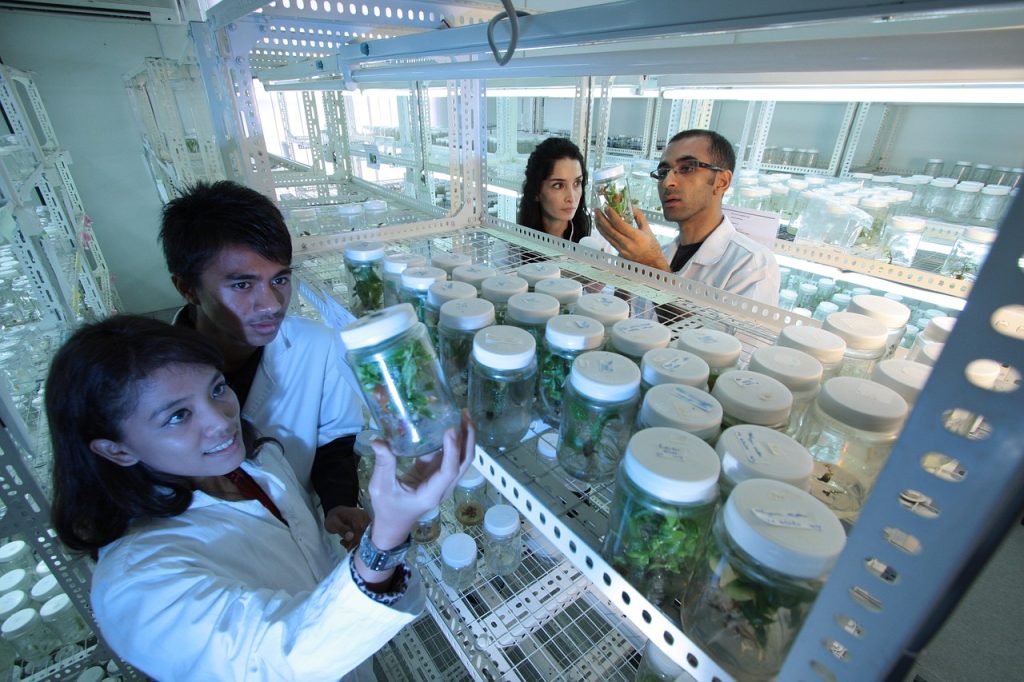Program Description
Biotechnology can be broadly defined as the use of living organisms in the design of useful products as well as the exploration of the genetic and biomedical basis of how living organisms function. Some of the fields in which biotechnology plays an important role are:
- Forensic Science;
- Medical research involving genetic diseases, cancer, screening and treatment and embryological development;
- Design of novel drugs aimed at specific biological targets;
- Crop design and genetically modified organisms;
- Production of relevant biologicals such as insulin for treatment of disease; and
- Basic research in areas like, genetics, biochemistry, evolution, and more.
Curriculum Coordinator: Dr. Raffaella Diotti

Biotechnological techniques allow genes to be isolated, amplified, and expressed in different organisms completely chemically characterized (sequenced). These techniques also allow for insight into the normal as well as pathological regulation of genes. This is a rapidly expanding field and trained individuals are needed.
The Biotechnology Program is a joint degree program with the City College of New York (CCNY) leading to a B.S. degree.
The first 60 credits, resulting in the AS Degree, are taken at BCC. To graduate from the AS Degree program, students must satisfy course requirements as well as college-wide requirements. For admission to the CCNY BS program, students are advised to complete their AS degree in Biotechnology at BCC with a minimum of a 3.0 cumulative GPA in math and science.
Learning Outcomes
Upon successful completion of the Biotechnology program requirements, students will be able to:
- Describe how genetic and chemical processes underlie all of biological function and can be manipulated for product development.
- Demonstrate proficiency in standard laboratory techniques and the ability to implement standard safety protocols in the laboratory.
- Demonstrate proficiency in the use of bioinformatics, statistical and instrumental applications for the analysis and comparison of nucleic acids and proteins.
- Plan, execute, and interpret an experiment following the scientific method and demonstrate critical thinking skills for problem solving.
- Qualify for transfer to a four year college with the necessary foundation in biology for further study in a wide variety of disciplines.
Biotechnology Curriculum
60 Credits required for AS Degree
Curriculum Coordinators: Dr. Raffaella Diotti
Required Core
- English Composition (6 Credits)
- Mathematical and Quantitative Reasoning
- MTH 28 College Algebra and Elementary Trigonometry (3 Credits) OR MTH 28.5 College Algebra and Elementary Trigonometry (Corequisite)
- Life and Physical Science
- BIO 120 Biology I: Molecules, Cells, and Genes (4 Credits)
SUBTOTAL 13
Flexible Core
- World Cultures and Global Issues (3 Credits)
- S. Experience in its Diversity (3 Credits)
- Creative Expression (3 Credits)
- Individual and Society (3 Credits)
- Scientific World
- BIO 121 Biology II: Organisms, Biodiversity, and Systems (4 Credits)
- MTH 30 Pre-calculus Mathematics (4 Credits)
SUBTOTAL 20
Major Requirements
- BIO 55 Genetics (3 Credits)
- BIO 56 Cell and Molecular Biology with an Introduction to Biotechnology (4 Credits)
- CHM 11 General College Chemistry I (4 Credits)
- CHM 12 General College Chemistry II (4 Credits)
- Free Elective1(3-4 Credits)
- MTH 311Analytic Geometry and Calculus (0-4 Credits)
- MTH 37 Elements of Calculus and Statistics (4 Credits)
- PHY 112College Physics I OR
CHM 31 Organic Chemistry I (4-5 Credits)
SUBTOTAL 27
1 Only students who place out of MTH 28 will have free electives.
2 Students who place out of MTH 28 can use one elective credit toward CHM 31. Students who do not place out of MTH 28 should select PHY 11 so as not to exceed the 60 credit limit for the program.
Degree Map
Find the map below and here.

